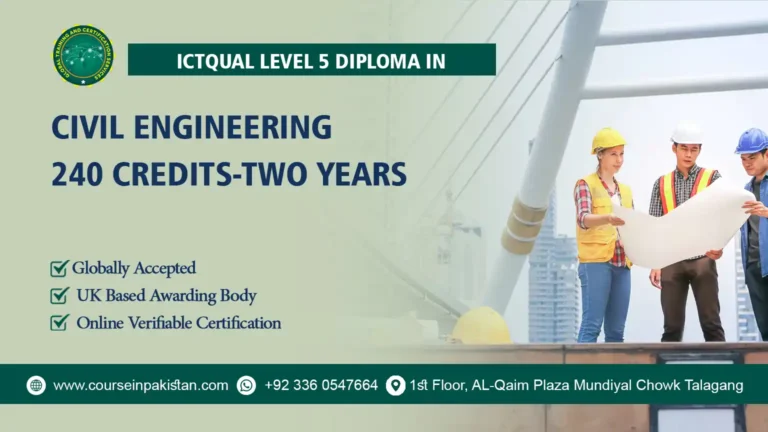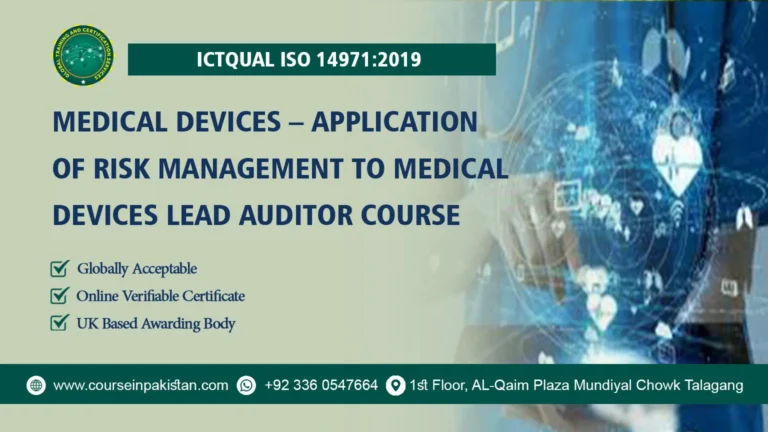
The ICTQual Level 6 Diploma in Civil Engineering (360 Credits – Three Years) is a globally recognized qualification designed to provide advanced theoretical knowledge and practical skills in civil engineering. This diploma is ideal for learners who aspire to build a professional career in construction, infrastructure development, and engineering management. Whether you are a fresh graduate looking to establish a solid foundation or an experienced professional seeking formal recognition of your expertise, this certification equips you with the essential tools to excel in the civil engineering industry.
This diploma emphasizes practical application, problem-solving, and professional competence, ensuring learners are well-prepared to handle complex engineering challenges. With its assignment-based structure, learners can study at their own pace, balancing professional and personal commitments while achieving a respected qualification that is recognized internationally.
Course Overview
The ICTQual Level 6 Diploma in Civil Engineering (360 Credits – Three Years) is a fully assignment-based program designed to allow learners to study at their own pace from anywhere in the world. This globally recognized qualification is British Council verificable, MOFA and Embassy attestable, making it highly valuable for international career opportunities and Iqama approval in Gulf countries. The program caters to both fresh students and experienced professionals.
Fresh learners are required to complete all 36 mandatory assignments within three years to achieve certification. Experienced professionals with at least six years of verifiable civil engineering experience can fast-track the certification by submitting proof of their experience and demonstrating their knowledge during professional discussion meetings with an ICTQual AB approved assessor, without completing all assignments.
The curriculum covers advanced topics in structural design, construction management, geotechnical engineering, and sustainable infrastructure solutions, ensuring that graduates are prepared for leadership roles and complex engineering challenges in the civil engineering industry. This flexible and comprehensive approach ensures that all candidates, whether starting fresh or already experienced, gain a respected qualification that enhances career prospects globally.
Key Highlights of the Course:
- Fully assignment-based program for self-paced learning.
- 360 credits qualification recognized internationally.
- Suitable for fresh graduates and experienced professionals.
- British Council verificable, MOFA and Embassy attestable for global recognition.
- Iqama approval eligible, enhancing career opportunities in Gulf countries
Course Benefits
1. Career Advancement
- Enables entry into senior civil engineering roles such as project manager, site engineer, or design consultant.
- Recognized qualification for promotions in public and private sectors.
- Enhances credibility with employers worldwide.
2. Flexibility and Convenience
- Fully assignment-based, allowing learners to study at their own pace.
- Access course material and complete assessments from anywhere in the world.
- Suitable for working professionals to balance learning and career.
3. Global Recognition
- British Council verificable, MOFA and Embassy attestable, enhancing international employability.
- Qualification accepted for professional licensing and Iqama approval in Gulf countries.
- Opens opportunities for global engineering projects and consultancy roles.
4. Suitable for All Levels of Experience
- Fresh graduates complete 36 assignments within three years to gain certification.
- Experienced professionals can leverage 6+ years of relevant experience to fast-track certification.
- Professional discussion with ICTQual AB approved assessor validates knowledge for experienced candidates.
5. Comprehensive Civil Engineering Knowledge
- In-depth coverage of construction, structural, geotechnical, and environmental engineering.
- Emphasis on practical applications, problem-solving, and sustainable engineering solutions.
- Prepares candidates for leadership and decision-making roles in complex engineering projects.
Course Study Units
This qualification, the ICTQual Level 6 Diploma in Civil Engineering 360 Credits – Three Years, consists of 36 mandatory units.
Year 1: Foundation and Core Engineering Concepts (120 Credits)
- Introduction to Civil Engineering
- Mathematics for Engineers
- Engineering Mechanics
- Construction Materials
- Surveying and Measurement
- Environmental Science for Engineers
- Technical Drawing and CAD
- Hydraulics and Fluid Mechanics
- Geology and Soil Mechanics
- Health and Safety in Construction
- Construction Methods and Technologies
- Communication and Professional Skills
Year 2: Advanced Engineering Topics and Specializations (120 Credits)
- Structural Analysis and Design
- Geotechnical Engineering
- Transportation Engineering
- Water Resources Engineering
- Building Information Modeling (BIM)
- Advanced Surveying and GPS Technologies
- Steel and Concrete Structures
- Sustainable Construction Practices
- Highway Design and Maintenance
- Construction Contracts and Law
- Project Planning and Management
- Engineering Economics
Year 3: Professional Practice, Innovation, and Capstone Projects (120 Credits)
- Professional Ethics and Responsibilities in Civil Engineering
- Advanced Structural Engineering Applications
- Bridge Design and Construction Management
- Foundation Engineering for Complex Projects
- Urban Infrastructure Planning and Development
- Earthquake-Resistant Structural Design
- Construction Site Management and Supervision
- Environmental Impact Assessment for Civil Projects
- Risk Assessment and Mitigation in Construction Projects
- Entrepreneurship and Leadership in Civil Engineering
- Smart Cities and Sustainable Infrastructure
- Capstone Project (Professional Practice)
Learning Outcomes
Year 1: Foundation and Core Engineering Concepts (120 Credits)
1. Introduction to Civil Engineering
- Understand the scope and branches of civil engineering.
- Recognize the roles and responsibilities of civil engineers in projects.
- Identify current trends and emerging technologies in civil engineering.
- Apply fundamental engineering concepts to real-world scenarios.
2. Mathematics for Engineers
- Apply calculus, algebra, and trigonometry in engineering problem-solving.
- Interpret and use statistical data for engineering applications.
- Solve engineering problems involving equations, matrices, and vectors.
3. Engineering Mechanics
- Analyze forces, moments, and equilibrium in structures.
- Apply principles of statics and dynamics to engineering problems.
- Evaluate mechanical behavior of materials under load.
4. Construction Materials
- Identify properties and uses of common construction materials.
- Assess material suitability for different civil engineering applications.
- Apply testing methods to evaluate material performance.
5. Surveying and Measurement
- Use surveying tools and techniques for accurate site measurement.
- Interpret and produce topographic and construction maps.
- Apply measurement principles to civil engineering projects.
6. Environmental Science for Engineers
- Understand environmental impacts of civil engineering projects.
- Apply sustainable practices in project planning and execution.
- Evaluate solutions to minimize environmental degradation.
7. Technical Drawing and CAD
- Produce engineering drawings using manual and CAD techniques.
- Interpret architectural and structural plans accurately.
- Apply CAD software in designing engineering components.
8. Hydraulics and Fluid Mechanics
- Understand properties and behavior of fluids in engineering systems.
- Apply principles of fluid mechanics in hydraulic designs.
- Solve engineering problems involving fluid flow and pressure.
9. Geology and Soil Mechanics
- Identify types of soils and rock formations for construction purposes.
- Evaluate soil properties and their impact on foundation design.
- Apply geotechnical principles to engineering site assessments.
10. Health and Safety in Construction
- Understand legal and ethical requirements for construction safety.
- Identify hazards and implement safety measures on construction sites.
- Develop risk assessments and safety management plans.
11. Construction Methods and Technologies
- Analyze various construction methods for efficiency and safety.
- Apply modern technologies in construction projects.
- Evaluate methods for quality and sustainability in construction.
12. Communication and Professional Skills
- Develop effective written and verbal communication for engineering contexts.
- Apply teamwork and leadership skills in professional settings.
- Demonstrate professional ethics in engineering practice.
Year 2: Advanced Engineering Topics and Specializations (120 Credits)
13. Structural Analysis and Design
- Analyze forces and stresses in structural components.
- Apply design principles to beams, columns, and frames.
- Evaluate structural stability and safety.
14. Geotechnical Engineering
- Design foundations and retaining structures based on soil analysis.
- Apply geotechnical investigation techniques for construction projects.
- Solve engineering problems related to soil-structure interaction.
15. Transportation Engineering
- Plan and design transportation networks and infrastructure.
- Evaluate traffic flow, safety, and road design standards.
- Apply sustainable transport solutions in urban and rural areas.
16. Water Resources Engineering
- Design systems for water supply, drainage, and flood control.
- Analyze hydrological data for engineering applications.
- Apply sustainable water management practices.
17. Building Information Modeling (BIM)
- Develop 3D models for construction planning and management.
- Integrate project information using BIM software.
- Enhance collaboration and efficiency in civil engineering projects.
18. Advanced Surveying and GPS Technologies
- Use GPS and advanced surveying instruments for precision measurement.
- Apply modern surveying techniques to complex engineering projects.
- Interpret geospatial data for design and planning purposes.
19. Steel and Concrete Structures
- Design and analyze steel and reinforced concrete structures.
- Apply codes and standards in structural design.
- Evaluate structural performance under various loading conditions.
20. Sustainable Construction Practices
- Implement eco-friendly and energy-efficient construction methods.
- Assess sustainability indicators in project planning.
- Apply principles of green building and resource management.
21. Highway Design and Maintenance
- Design highways and pavements according to engineering standards.
- Apply maintenance strategies for road longevity.
- Evaluate traffic management and safety considerations.
22. Construction Contracts and Law
- Understand legal frameworks governing construction projects.
- Analyze contracts and obligations of stakeholders.
- Apply dispute resolution and compliance practices in projects.
23. Project Planning and Management
- Develop project plans using scheduling and resource allocation tools.
- Apply project management methodologies in civil engineering projects.
- Monitor and control project progress to achieve objectives.
24. Engineering Economics
- Apply cost analysis and budgeting in construction projects.
- Evaluate financial feasibility of engineering designs.
- Optimize resources to maximize project efficiency and profitability.
Year 3: Professional Practice, Innovation, and Capstone Projects (120 Credits)
25. Professional Ethics and Responsibilities in Civil Engineering
- Understand ethical obligations of engineers in society.
- Apply professional codes of conduct in engineering practice.
- Make decisions that prioritize safety, sustainability, and public interest.
26. Advanced Structural Engineering Applications
- Solve complex structural engineering problems.
- Apply advanced analysis techniques to design large-scale structures.
- Evaluate structural performance under extreme conditions.
27. Bridge Design and Construction Management
- Design bridges considering load, materials, and environmental factors.
- Plan and manage bridge construction projects efficiently.
- Apply safety and maintenance standards in bridge engineering.
28. Foundation Engineering for Complex Projects
- Design foundations for high-rise buildings and challenging sites.
- Assess soil-structure interactions for stability.
- Apply geotechnical investigation results to foundation solutions.
29. Urban Infrastructure Planning and Development
- Plan urban infrastructure including roads, utilities, and drainage.
- Evaluate urban development projects for sustainability.
- Apply planning regulations and standards in urban projects.
30. Earthquake-Resistant Structural Design
- Design structures to withstand seismic activity.
- Apply building codes for earthquake-prone regions.
- Evaluate structural resilience and safety under dynamic loads.
31. Construction Site Management and Supervision
- Organize and supervise construction site operations.
- Implement quality control, safety, and environmental standards.
- Manage teams, resources, and timelines effectively.
32. Environmental Impact Assessment for Civil Projects
- Conduct environmental assessments for construction projects.
- Identify mitigation measures to minimize environmental damage.
- Prepare reports that comply with regulatory requirements.
33. Risk Assessment and Mitigation in Construction Projects
- Identify potential risks in civil engineering projects.
- Apply strategies to prevent or mitigate risks.
- Develop risk management plans to ensure project success.
34. Entrepreneurship and Leadership in Civil Engineering
- Develop entrepreneurial skills for engineering ventures.
- Apply leadership techniques in project and team management.
- Explore innovative solutions in civil engineering projects.
35. Smart Cities and Sustainable Infrastructure
- Integrate technology and sustainability in urban infrastructure.
- Plan smart infrastructure projects to improve efficiency and livability.
- Evaluate the social, economic, and environmental impact of smart city initiatives.
36. Capstone Project (Professional Practice)
- Apply knowledge from all prior units to a comprehensive project.
- Demonstrate problem-solving, design, and management skills.
- Present a professional report and defend the project to assessors.
Who is This Course For?
- 1. Fresh Graduates
- Individuals who have recently completed high school or a relevant Level 5 qualification.
- Looking to establish a strong foundation in civil engineering.
- Keen to gain internationally recognized certification.
- Interested in assignment-based learning at their own pace.
- Motivated to build a professional career in construction and infrastructure.
- 2. Experienced Professionals
- Civil engineers with 6+ years of verifiable industry experience.
- Seeking formal recognition of their skills without completing all assignments.
- Want to validate expertise through professional discussion with an ICTQual AB assessor.
- Interested in fast-tracked certification for career advancement.
- Looking for globally recognized qualifications for international opportunities.
- 3. Career Switchers
- Professionals from related technical or engineering fields aiming to enter civil engineering.
- Motivated to gain theoretical knowledge and practical skills in civil engineering.
- Looking for flexible learning options to balance work and study.
- Interested in expanding career opportunities globally.
- Keen to pursue higher academic qualifications in civil engineering.
- 4. International Learners
- Individuals aiming for employment or career opportunities abroad.
- Interested in MOFA, Embassy attested, and British Council verified certification.
- Looking for qualifications eligible for Iqama approval in Gulf countries.
- Motivated to gain skills recognized by global employers.
- Seeking flexible learning options without geographical constraints.
Future Progression
- Eligible for senior civil engineering roles such as project manager, site engineer, or design consultant.
- Opportunities to pursue higher academic qualifications such as a Master’s in Civil Engineering or Construction Management.
- Increased employability in international construction and infrastructure projects.
- Potential for consultancy roles in government and private sectors.
- Recognition for licensing and professional certification in civil engineering globally.
Academic Pathways:
- Progression to Master’s degrees in Civil Engineering or Structural Engineering.
- Opportunity to enroll in specialized certifications in construction management, geotechnical engineering, or sustainable infrastructure.
- Pathway to professional chartered engineer status or other internationally recognized engineering certifications.
- Access to advanced research and academic opportunities in engineering institutions worldwide.
Conclusion
The ICTQual Level 6 Diploma in Civil Engineering (360 Credits – Three Years) is a comprehensive and flexible program designed to meet the needs of both fresh learners and experienced professionals. With its globally recognized certification, assignment-based learning, and verification options through the British Council, MOFA, and Embassy, this diploma opens doors to international career opportunities and Iqama approval in Gulf countries. Graduates gain in-depth knowledge of civil engineering principles, practical problem-solving skills, and leadership capabilities, preparing them to excel in complex engineering projects and take on senior roles in the construction and infrastructure industry.






